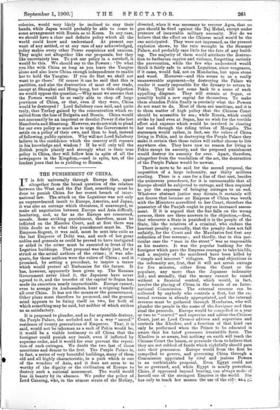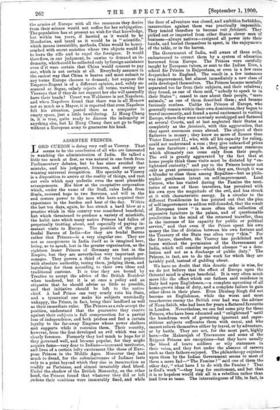THE PUNISHMENT OF CHINA.
IT is felt universally through Europe that, apart altogether from the broad question of the relation between the West and the Far East, something must be done to punish China for her recent breach of inter- national law. The attack on the Legations was not only an unprecedented insult to Europe, America, and Japan, it was also an outrage which threatens, if unavenged, to make all negotiation between Europe and Asia difficult, hesitating, and, as far as the Envoys are concerned, unsafe. Some striking punishment, therefore, must be inflicted on the Manchu Court, and at first there was little doubt as to what this punishment must be. The Empress-Regent, it was said, must be sent into exile as the last Emperor of Delhi was, and such of her great nobles and generals as could be proved to have instigated or aided in the crime must be executed in front of the Legation buildings. That proposal was fairly just, for it struck at the actual authors of the crime ; it was ade- quate, for those authors were the rulers of China ; and it promised, by setting a precedent, to inspire a terror which would protect all Embassies for the future. It has, however, apparently been given up. The Russian Government never liked it, the Japanese have never agreed to it, and the transfer of the capital to Segan has made its execution nearly impracticable. Europe cannot, even to avenge its Ambassadors, hunt a reigning familyt all over China. It has not the means or the perseverance. Other plans must therefore be proposed, and the general mind appears to be fixing itself on two, for both of which something may be said, but neither of which strikes us as satisfactory.
It is proposed to plunder, and as far as possible destroy, the Purple Palace, the secluded and in a, way " sacred " residence of twenty generations of Emperors. That, it is said, would not be inhuman as a sack of Pekin would be, it would be a visible testimony to all China that the foreigner could punish any insult, even if inflicted by supreme order, and it would for ever prevent the repeti- tion of such outrages. We doubt the two last of those assertions and demur to the first. The Purple Palace is, in fact, a series of very beautiful buildings, many of them old and all highly characteristic, in a park which is one of the wonders of Asia, and it does not seem to us worthy of the dignity or the civilisation of Europe to destroy such a national monument. The world would lose in beauty by its 'absence. We prefer the policy of Lord Canning, who, in the utmost strain of the Mutiny, directed, when it was necessary to recover Agra, that no gun should be fired against the Taj Mehal, except under pressure of inexorable military necessity. Nor do we believe that the effect on the Chinese mind would be the one anticipated. They were not impressed, as the present explosion shows, by the ruin wrought in the Summer Palace, and probably care little for the fate of any build- ing. The majority of them would attribute the destruc- tion to barbarian caprice and violence, forgetting entirely the provocation, while the few who understood would think it fairly safe to attack Legations, since vengeance, if it came, would fall, not on Mandarins, but upon stone and wood. Moreover—and this seems to us a really unanswerable argument—by destroying the Palace we render it nearly impossible for the dynasty to return to Pekin. They will not come back to a scene of such appalling disgrace. They will remain at Segan, or possibly build a new capital for themselves. To make them abandon Pekin finally is precisely what the Powers do not want to do. Most of them are maritime, and it is to them matter of high policy that the Chinese Court should be accessible by sea ; while Russia, which could strike by land even at Segan, has no wish for the terrible effort and expense which would be involved in clearing her road through the riding tribes of Mongolia. The statesmen would rather, in fact, see the rulers of China living in Pekin, and in destroying the Purple Palace they make it certain that those rulers will rather choose to live anywhere else. They have now no reason for living in Pekin except its amenity, and the proposed punishment would destroy its amenity for ever. Apart, therefore, altogether from the vandalism of the act, the destruction of the Purple Palace would be unwise.
There is more to be said for the second proposal, the imposition of a large indemnity, say thirty millions sterling. There is a case for a fine of that sort, besides the numerous precedents, for it is unreasonable that all Europe should be subjected to outrage, and then required to pay the expenses of bringing outrages to an end. Whatever abstract justice may dictate, it certainly will not decree that because an Empress of China was wroth with the Ministers accredited to her Court, therefore the peasantry of the Punjab ought to pay an increased assess- ment. If it is argued that the fine falls on the wrong persons, there are three answers to the objection,—first, that whenever a State is punished it is the people of the State, like the relatives of a criminal, who endure the heaviest penalty ; secondly, that the penalty does not fall unfairly, for the Court and the Mandarins feel first any reduction of free revenue ; and thirdly, that in this par- ticular case the "man in the street" was as responsible as his masters. It was the popular loathing for the foreigner which gave the Empress courage to take his life, and a majority of the murdered have been killed by "simple and innocent" villagers. The real objections to the indemnity are, first, that it will not arrest outrage for five minutes, either from the Court or the populace, any more than the Japanese indemnity did ; and secondly, that the money cannot be raised without a financial control, which would, in fact, involve the placing of China in the hands of an Inter- national Commission. The external revenue can be collected by anybody who controls a fleet, but the ex- ternal revenue is already appropriated, and the internal revenue must be gathered through Mandarins, who will plunder the people in the name of the foreigner and then steal the proceeds. Europe would be compelled in a year or two to "control" and supervise and advise the.Chinese Court, just as Lord Cromer advises and supervises and controls the Khedive, and a function of that kind can only be performed when the Prince to be educated is aware that his tutor possesses irresistible force. The Khedive is so aware, but nothing on earth will teach the Chinese Court the lesson, or persuade them to believe that they are not robbed of funds which rightfully should pass into their possession. Europe would from the first be compelled to govern, and governing China through a. Commission appointed by rival and jealous Powers is an unthinkable proposal. Even Egypt could. not be so governed, and, while Egypt is nearly powerless. China, if oppressed beyond bearing, can always make of herself one of the strongest Empires in the world. She has only to teach her masses the use of the rat-. tirki the armies of Europe with all the resources they derive from their science would not suffice for her subjugation. The population has at present no wish for that knowledge, but within ten years, if harried as it would be by Mandarins, and taxed as it would be in " scientific," which means irresistible, methods, China would be honey- combed with secret societies whose two objects would be to learn the rifle and to expel the foreigner. It would therefore, in our judgment, be unwise to demand an in- demnity, which could be collected only by foreign assistance even if it were certain that China would consent to pay one, which is not certain at all. Everybody assumes in the easiest way that China is beaten and must submit to any terms Europe chooses to demand ; but suppose the Empress-Regent is of a different opinion, and, safely en- sconced at Segan, calmly rejects all terms, warning her Viceroys that if they do not support her she will assuredly have their heads ? Count von Waldersee is not Napoleon, and when Napoleon found that there was in all Moscow not so much as a Mayor, it is reported that even Napoleon felt his situation, posted there as a conqueror in empty space, just a little bewildering. Li Hung Chang is, it is true, quite ready to discuss the indemnity or anything else, but Li Hung Chang dare not go to Segan without a European army to guarantee his head.



































 Previous page
Previous page